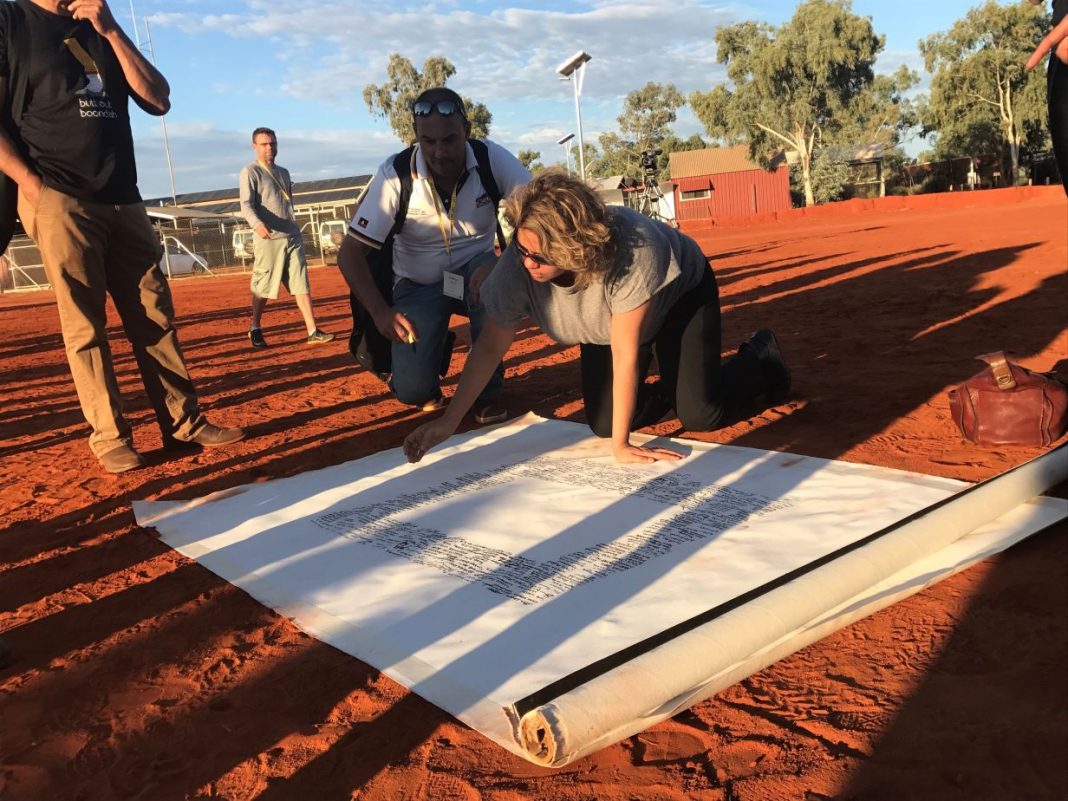On Saturday 14 October, Australians will line up at polling booths across the nation to cast their vote in the country’s 45th referendum. Some will vote Yes, to recognise Australia’s First Nations Peoples by enshrining the Voice to Parliament in the Australian constitution. Others will vote No to the need to change the constitution to both listen to and support First Nations Peoples.
One of the most significant drivers of wider community support is the belief that both the Uluru statement from the heart and the Voice are overwhelmingly supported by Australia’s First Nations Peoples. Those who designed the Voice to Parliament and those who support it, spearheaded now by the Australian Labor Party, claim that most First Nations people support the Voice.
According to the Yes23 campaign, ‘Over 80 per cent of the Aboriginal and Torres Strait Islander communities support the Voice’ which, if it is correct would appear to be a reasonable justification to the notion that voting Yes is simply the ‘right thing to do’.
At a recent event in a Queanbeyan pub however, amidst a backdrop of raffles and birthday cheers, approximately 80 people gathered for ‘Pollies in the Pub’, a NSW National Party event. NT Senator Jacinta Nampijinpa Price joined locals for a meal and to share her emphatic opposition to the notion that the Voice is a direct request from the majority of First Nations Peoples.
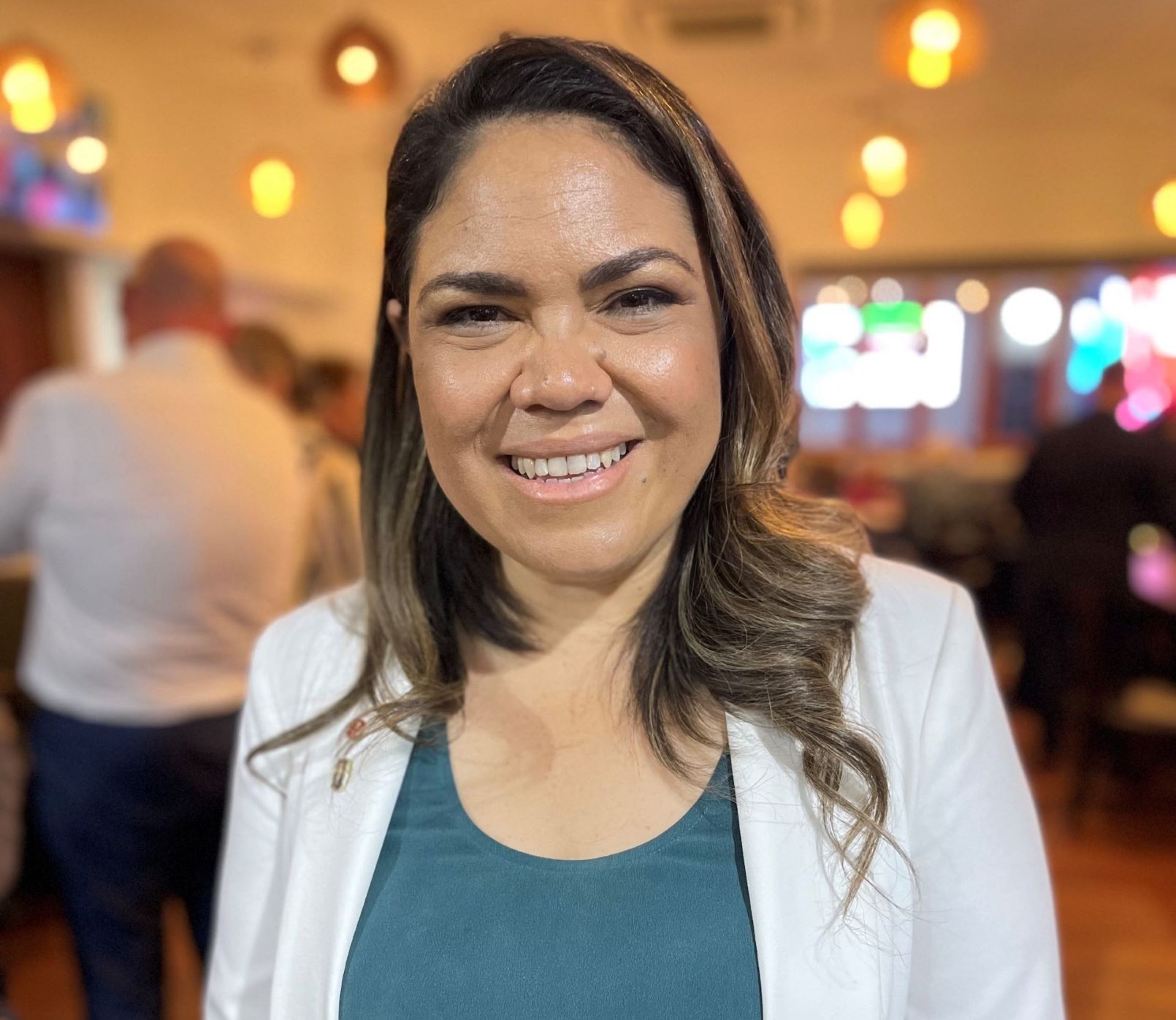
“It’s misleading to suggest that a race of people in this country all want this. There are a lot of Aboriginal people who don’t,” she said.
And whilst Nioka Coe may not agree with Senator Nampijinpa Price on many things, she does agree that she is one of those who does not want to see the Voice enshrined in the Constitution. Coe is a Wiradjuri/Gomeroi woman and the daughter of Isabel Coe and Billy Craigie.
Isabel was one of Australia’s leading Aboriginal activists, and Billy was co-founder in 1972 of the Aboriginal Tent Embassy along with Professor Ghillar Michael Anderson, Bertie Williams and Tony Coorey.
The Tent Embassy is the longest continuous protest for Indigenous land rights in the world and Coe is taking her family turn in residence to “assert my right as a sovereign person,” she told Canberra Daily. “I’m here representing my mother and father’s interests and making sure that their voices and the work they did carries on.”
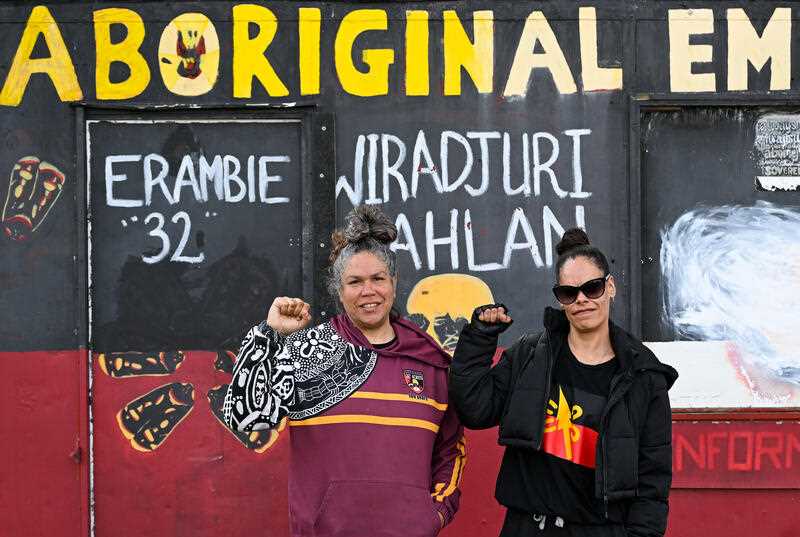
Sitting under the trees on the grounds of the Embassy, Coe’s softly spoken voice belies her articulate and resolute determination regarding her purpose and her position on the Voice to Parliament.
“I don’t believe any of their stats or what they’re trying to say. Who are these 80 per cent?” she said.
“The majority of our people don’t even know what the Voice is. Out in the communities they have no idea. It’s all propaganda. How much money are they putting into saying yes? A lot of our people don’t really understand what’s going on. We have to remind people that we did have delegates that were interested in having these discussions with the Referendum Council and travelled all the way to Yulara back in 2017 and they were turned away.”
Coe maintains that most Wiradjuri people were neither consulted nor included in discussions regarding the statement from the heart and the ensuing Voice to Parliament.
“Wiradjuri people are one of the largest nations in NSW and we were turned away by the Referendum Council. There was no inclusion. We haven’t been included in the conversations.”
Lawyer, mathematician, astronomer, Euahlayi Elder and Senior Lawman, Professor Ghillar Michael Anderson agrees, “80 per cent of First Peoples don’t know about it or are confused”.
Canberra Daily has contacted key proponents of the Voice, including federal politicians, local and federal agencies, and individuals, seeking confirmation of the evidence which supports the 80 per cent claim.
Supporters of the Voice were also asked if they were aware of how many of the more than 350 nations had been included or excluded in the 13 Uluru Dialogue meetings, which preceded the signing of the Uluru statement from the heart, meetings which took place between December 2016 and May 2017 and involved speaking with 1,200 First Nations Peoples.
ACT independent Senator David Pocock, who was quoted in a recent Canberra Daily article as saying, “Do we want to be a country that has a request from the continent’s First Peoples saying recognise us, give us a voice – and us say no?”, declined the opportunity to offer a comment and provide further details.
No response was received from Senator Katy Gallagher’s office.
The ACT Office for Aboriginal and Torres Strait Islander Affairs (OTSIA), responded that this information would best be provided by the National Indigenous Australians Agency (NIAA). The NIAA responded by phone and agreed to forward comments, however, no information was subsequently received.
No response was received from the office of the Uluru Dialogues, and input was invited from local Canberra Elders via the Traditional Owners Aboriginal Corporation and Ngunnawal Elders. No responses were received, apart from Elder Aunty Violet Sheridan who initially agreed to an interview, however later declined. Sheridan stated, “I am not prepared to answer your questions so there’s a no comment from me”. Sheridan was also invited to suggest other local Elders who may be able to contribute. No further responses were received.
A Yes23 spokesperson, however, promptly forwarded a response to the question regarding the source of the majority consensus, “YouGov between March 1 and March 21 (2023) conducted online. The company surveyed 15,060 Australians across the country and weighted them for age, gender, location, education and on how they voted at the 2022 election.
“Of these, 738 were identified as being Indigenous from having answered a question on Indigenous identity either at the time or in a previous survey.
“Of the Indigenous sample, 83 per cent of respondents said they would either vote Yes or were leaning towards doing so.”
This survey was commissioned by the Uluru Dialogues and selected people from “previously recruited online panels of research participants to fill quotas loosely based on weighting frame”.
Yes23 did not respond to the request for information regarding whether all First Nations Peoples had been represented in the Uluru Dialogues.
A previous online survey, also commissioned by the Uluru Dialogues, was conducted by IOPSIS in January 2023, which reports an effective sample size of 181 self-identified First Nations Peoples.
Respondents were selected from existing panels of people agreeing to take part in surveys.
There does not appear to have been any further nationwide surveys conducted and no further information provided nor easily accessible which can confirm that the majority of First Nations Peoples supported either the statement from the heart or the Voice to Parliament.
The two surveys are now over six months old.
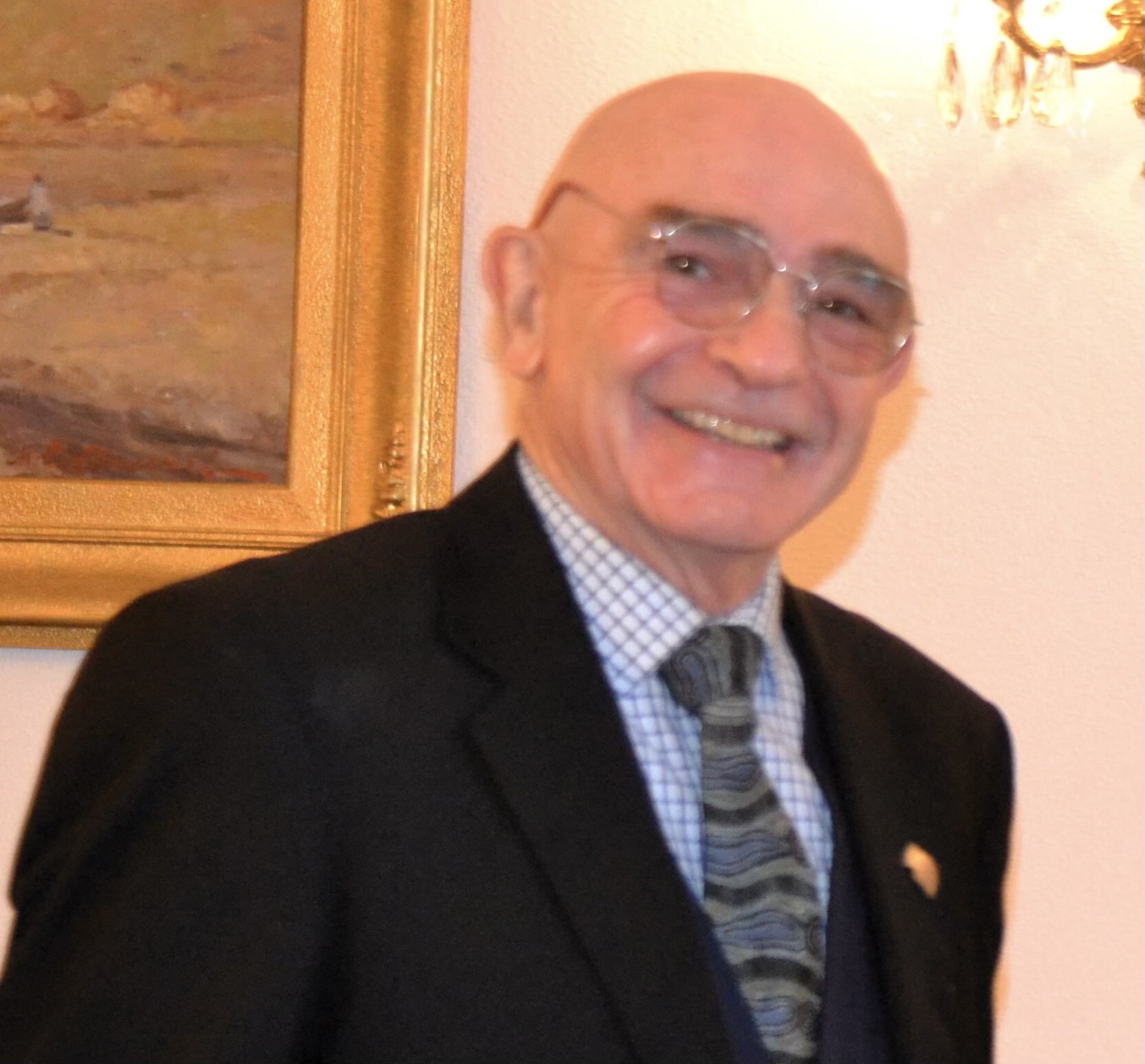
Local man and Ngambri Elder, Shane Mortimer, also finds the claim of 80 per cent consensus hard to believe.
“Most of the people I speak to oppose the whole thing. And on solid ground,” he said.
Mortimer was present at one of the Dialogue meetings where delegates, according to the Referendum Council, attended “by invitation only”.
“They had 13 public consultations. Of the 13 public consultations, I attended the one here in Canberra. There was no ‘consultation’, they were just telling us what they were going to do.”
Professor Megan Davis, key Yes campaigner and architect of the Uluru statement from the heart also confirmed during a National Press Club address in November 2022 that “We also banned significant leaders from the movement because of their cynicism about government and the country changing, and that wasn’t great for a law reform process … so we wouldn’t allow many of them to speak. But we also wouldn’t allow people with a voice.”
According to Mortimer, “the Uluru Dialogues were a contrivance”.
“I have a photograph of Noel Pearson with a signed blank canvas … just all the signatures on a blank canvas. That blank canvas would not stand up in a court of law. The statement wasn’t written on there until much later … in Melbourne.”
Senator Nampijinpa Price went further regarding the statement from the heart, adding that, “There were those who were threatened with cultural punishment if they didn’t want to agree with the statement”. A statement that appears to be supported by ‘The Walkout Statement’ prepared by various First Nations Peoples who were present at the Uluru meeting, and are opposed to ‘Constitutional Recognition and Manufactured Consent’ to which Nioka Coe and Professor Ghillar Michael Anderson are signatories.
First Nations People not ‘one homogenous group’
It is no secret that there are considerable ideological differences amongst First Nations Peoples who do not support either the Uluru statement from the heart, or who do not believe that the Voice to Parliament will deliver Australia’s First Nations Peoples the opportunity to determine what is best for them.
However, in addition to agreeing on a lack of majority consensus, those spoken with do appear united in their agreement that the construct of the Voice is neither culturally appropriate nor a pathway to better outcomes for those in their respective communities.
According to Senator Nampijinpa Price, “It’s not true to suggest that as a group of Australians that we are one homogenous group. This is a racial stereotype that has come out of this debate and has been pushed on to Aboriginal people”.
Mortimer agrees, “It is an act of aggression for one nation or clan to speak on behalf of another nation or clan. I don’t speak for other nations, and I don’t expect other nations to speak for me”.
And from Coe, “To speak on behalf of another tribe or clan is a breach of our protocols. You don’t go into another person’s country and make decisions on their behalf. You need to sit down with those people and discuss that.”
The Sovereign Union, formed in 1999 to assert “genuine pre-existing and continuing sovereignty over First Nations’ territories, lands, waters and natural resources,” states in relation to the Voice: “It undermines cultural governance protocols by allowing a select group of hand-picked people to speak on behalf of all 350+ nations across the continent, who hold the right to speak for themselves.” And that further: “All nations across this country maintain the right to continued independence and statehood, our sovereignty from the Crown of Great Britain and from their colonial government. Each has its own Lore, politics, tradition, Elders and decision-making mechanisms.”
This past week, 6-7 October, Professor Anderson travelled to Uluru to join a delegation of numerous other Senior Law men and women who belong to Uluru as well as those who travelled from elsewhere in Australia to “discuss the abuse of the cultural and intellectual property rights against the whole approval of those people who have cultural ties and responsibilities to the culture of Uluru. This has been upsetting many of the Senior Law Men and Law Women, to know of the divisive and negative nature that has been caused to First Nations in Australia,” he said.
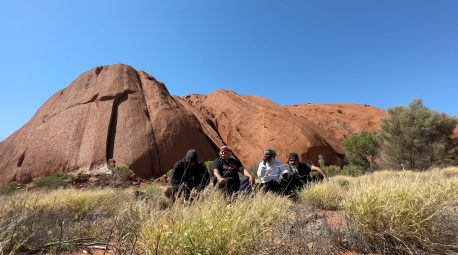
“Using the term Uluru for a white man’s outcome is an insult and an abuse of power, violating every aspect of human decency.”
This would appear to echo the 2017 request by Anungu Tribal elders to remove the word Uluru from the statement from the heart because consent was not given for its use.
The following statement, also able to be viewed with an accompanying video below and authorised by Anunga Senior Law Man Murray George, was issued after the recent meeting at Uluru and was released and provided to Canberra Daily on Monday 9 October:
Tjurkurpa Declaration
7 October 2023
“A meeting of Senior Lawmen and Wati took place at the northwest part of Uluru and at the Outback Resort, Yulara on 6 & 7 October 2023 with observers from Murrawarri and Budjiti. During the meeting, regular connection was had between Lawmen from various regions in SA and NT via Facetime and phone conferencing.
The meeting’s concluding determination is that, in spite of the proposed referendum on 14 October, the holders of the spiritual Celestial ancient Law of these lands affirm that “the Voice”, if successful, will have no authority, nor effect, nor be able to pretend to speak on First Nations Law and Cultural observances, known as the Tjurkurpa.
The absolute authority of the Tjurkurpa is the intellectual property right of Senior Ceremonial Elders, referred to as the Tjilpi and Wirring’un. In other locations in Australia these Law holders are known by separate names in their regions.
This ancient spiritual knowledge comes through the Songs that belong to the sites of Creation, and they link together across this vast continent. It is important for all to understand and accept that no-one other than the Tjilpi has the power and authority to speak on the sacred and spiritual. There is no proxy in Tjurkurpa.
In 1970 Pope Saint Paul VI affirmed the integrity of our spirituality based on Celestial Law during his visit to the Northern Territory by stating,
We know that you have a lifestyle proper to your own ethnic genius or culture – a culture which the Church respects and which she does not in any way ask you to renounce.
The power and authority of the Tjilpi is further affirmed by the High Court decision in Mabo (No.2) which ruled at paragraph 65,
Native title, though recognized by the common law, is not an institution of the common law and is not alienable by the common law.
Prime Minister Albanese, Attorney-General, Mr Mark Dreyfus MP, and future political leaders and First Nations advisers to government must accept, on behalf of the Australian people, that their parliament and their law courts cannot impede, impact or overrule any decision made by the Senior Lawmen in respect to protecting the sacred Country, sacred places and spaces, and our right to access the same for rituals and ceremonies. This includes accessing our ancestral Celestial Law-grounds on all lands, waters, air space within the spiritual realm. Any colonial land laws that impact, impairs or purport to bar us from practising our sacred rituals and rights will violate constitutional section 116 on religious freedom.
116 Commonwealth not to legislate in respect of religion
The Commonwealth shall not make any law for establishing any religion, or for imposing any religious observance, or for prohibiting the free exercise of any religion, and no religious test shall be required as a qualification for any office or public trust under the Commonwealth.
We will no longer permit our cultures to be erased by the colonisers’-imposed laws. Mining companies, agribusiness and other developers must now turn to the Senior Lawmen for the right to do anything on Country.
You say we get royalties from mining companies but only white administrators, who look after the trusts, make money and we get vouchers. This is economic apartheid. No equality here, because we are not allowed to have the money that you say belongs to us.
We have sat back and watched for too long as our Country and Mother Earth are being torn apart for the sake of mobile phones, computers, solar panels, electric cars, and profit. It is our decision that if you want these things then go back to your own country and dig up England, China or India, or countries in Europe.
We no longer accept, nor tolerate, your belligerence towards us and our Tjukurpa.
Your native title takes away our rights and falsely pretends that it is for our benefit. No! native title is for the coloniser to continue stealing from us and our Country. You create government funded organisations which are supposed to address issues like health, housing and education, but you keep failing our Peoples, which is confirmed by your own annual reports, e.g. Closing the Gap. These Prescribed Body Corporates and peak bodies are paid by government to keep us oppressed and beggars in our own lands.
The referendum for a voice is to finalise the pathway to assimilation of First Nations into the Australian Constitution. We have no intention to validate the illegal colonial Constitution from Britain.
The proposed Voice to parliament may, or may not, help our people, because in all your promotions on the Voice you keep telling the Australian public that you, the Parliament and the Executive Government can and will exercise your prerogative to listen or not to listen, effectively granting you the power of veto. That’s alright if you listen to them and take notice, but you and the Voice cannot and will not interfere with the Tjukurpa.
Authorised by Senior Tjilpi for Tjukurpa,
Murray George (Fregon) South Australia
Ghillar Michael Anderson (Goodooga) NSW
Frank Young (Amata) South Australia
Donald Fraser (Ernabella/Kenmore/Uluru) South Australia
Clem Toby (Ernabella) South Australia
Graham Kulyuru (Ernabella) South Australia
Lee Brady (Kanpi) South Australia
Mr Miller (Pipalyatjara) South Australia
Robert Stevens (Fregon) South Australia
Peter Mitchell (Docker River) Northern Territory
Sammy Dodd (Mimili) South Australia
Stanley Young (Pipalyatjara) South Australia
Alex Baker (Indulkana) South Australia
Huey Cullen (Indulkana) South Australia
Charlie Anytjipalya (Indulkana) South Australia
Winmati Roberts (Fregon) South Australia
Johnny Roberts (Fregon) South Australia
Witjiti George (Fregon) South Australia
Taylor Cooper (Fregon) South Australia
Wangan (Fregon) South Australia
Keith Stevens (Nyapari) South Australia
Dickie Marshall (Amata) South Australia
Willy Tingku (Oak Valley) South Australia
Alwyn Bates (Wanarn) Western Australia
Mr. Bennett (Warakurna) Western Australia
Ringo (Docker River) Northern Territory
Bruce Williamson (Yalata) South Australia
Mr. Woods (Jameson) Western Australia
Winston Mitchell (Blackstone) Western Australia
Bernard Newbury (Wanarn) Western Australia
Mr. Foster (Wingellina) Western Australia
David Coombes (Imanpa) Northern Territory
Colin Peterson (Newman) Pilbara, WA
Teddy Bilbiju (Meekathara) WA
Whilst at Uluru for this meeting of Elders, Professor Anderson also reported that he had been approached by locals at Uluru who told him quietly that they’re being told “… that if they don’t vote yes, they could stand to lose their lands and that no one will fix up houses for you. Only if you vote yes will this be avoided.”
Professor Anderson added that, “People are frightened to say anything publicly because of vicious repercussions against them as has happened with the military intervention. They do not understand how the white world operates and because they are dependent, they won’t say anything, only on the quiet”.
Yes or No, the choice is yours
This week, Australians are being asked to decide whether permanently enshrining a Voice to Parliament in the constitution is the best way to listen and provide support to First Nations Peoples.
The Yes23 website states that the Voice is a ‘…direct request from Aboriginal and Torres Strait Islander Australians’.
In the absence of recent and compelling statistical evidence regarding this, what is available is the opportunity to listen to a diverse representation of First Nations Peoples’ voices.
Those who are seeking constitutional change and those who are not.
Senator Nampijinpa Price has this message for Australians as they consider their choice on the referendum, “Look into the details. Look into the fact that even Elders from Uluru themselves are really displeased with the fact that the name ‘Uluru’ has been exploited for the purpose of the PR campaign to gain yes votes, and that there are certainly Elders who do not support this at all going ahead.”
Shane Mortimer invites Australians to consider that, “There are good reasons to vote No, including that it is a one-sided contest. It’s an unfair situation because the Yes vote is so fully funded. Because it has been such an unfair campaign, you have to question the motive. Why is the government spending so much money on this?”
Finally, Nioka Coe’s fear should the Voice to Parliament referendum be successful is ironically that, “We won’t have a voice”.
“We have to be what other people tell us to be in our own country. There is a lot of misinformation happening amongst the Australian people. And they are all being led to vote No and Yes, yet still our people only make up a certain percentage of the population in this country, so it doesn’t matter if we vote Yes or No.
“We still aren’t going to make up that vote.
“It’s not about us. The rest of the Australian people are going to make this decision.
“It will have nothing to do with us,” she said.
Canberra Daily is keen to hear from you about a story idea in the Canberra and surrounding region. Click here to submit a news tip.

